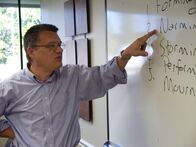Jim Rose, Director

I often tell people I am a third-generation pastor. By that I mean that my Dad was a pastor and my grandfather before him. You could say professional ministry was in my genes. That doesn't give me as much street-cred as it may appear, however! And after 40 years, as I look back on what God had to do to transform all that natural strength, I realize that my ministry genome--if there is such a thing--means very little.
In 1980, I graduated from Cornerstone University (now Grand Rapids Baptist College), with a Bachelor's degree in religion and philosophy. That was a big year because I was also ordained as a minister of the gospel and married to Cindy McCormack. Shortly after that, I attended Calvin College (now Calvin University) in Grand Rapids and in 1982 received a Master's degree in Christian studies, focused specifically on "uses of liturgical drama" in worship.
I am not going to recount in detail all the twists and turns of my early ministry here. I do that at length in many of my published resources. But I will say that by 1987, still a young minister, I had burned out and felt washed up, and decided pastoral ministry was not for me. It was then I caught a glimpse of bi-vocational ministry which became a distinctive part of my professional life from that day until the present. Like the Apostle Paul, I have been a "tent-making minister" ever since.
Though I did return to pastoral ministry in 1998, it would never again be as a lead pastor but a part time associate. It was then I became pastor of discipleship and family ministry at Community Evangelical Presbyterian Church where I have served ever since.
Then, in 2005, the opportunity arose to pursue a lifelong dream in clergy care. It was then that I became director and clergy counselor for Nehemiah Ministries Inc. In that position I was encouraged to return to graduate school and become a licensed professional counselor, which I completed in 2008. Over the next years of working with ministers in trouble, I began to develop the specialized treatment strategies and resources that populate this website. The "centers" you find here are concrete articulations and expressions of my counseling theory and practice. We strive diligently to root all our services and resources in traditional, evangelical Christian understanding.
In 1980, I graduated from Cornerstone University (now Grand Rapids Baptist College), with a Bachelor's degree in religion and philosophy. That was a big year because I was also ordained as a minister of the gospel and married to Cindy McCormack. Shortly after that, I attended Calvin College (now Calvin University) in Grand Rapids and in 1982 received a Master's degree in Christian studies, focused specifically on "uses of liturgical drama" in worship.
I am not going to recount in detail all the twists and turns of my early ministry here. I do that at length in many of my published resources. But I will say that by 1987, still a young minister, I had burned out and felt washed up, and decided pastoral ministry was not for me. It was then I caught a glimpse of bi-vocational ministry which became a distinctive part of my professional life from that day until the present. Like the Apostle Paul, I have been a "tent-making minister" ever since.
Though I did return to pastoral ministry in 1998, it would never again be as a lead pastor but a part time associate. It was then I became pastor of discipleship and family ministry at Community Evangelical Presbyterian Church where I have served ever since.
Then, in 2005, the opportunity arose to pursue a lifelong dream in clergy care. It was then that I became director and clergy counselor for Nehemiah Ministries Inc. In that position I was encouraged to return to graduate school and become a licensed professional counselor, which I completed in 2008. Over the next years of working with ministers in trouble, I began to develop the specialized treatment strategies and resources that populate this website. The "centers" you find here are concrete articulations and expressions of my counseling theory and practice. We strive diligently to root all our services and resources in traditional, evangelical Christian understanding.
